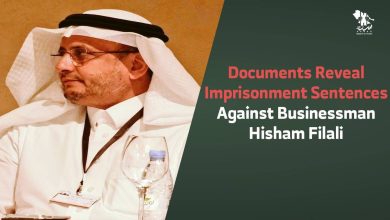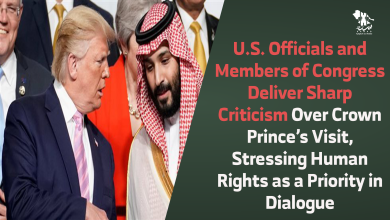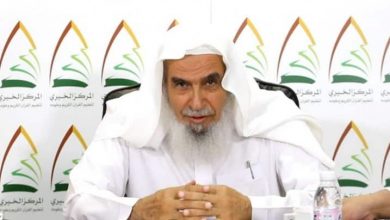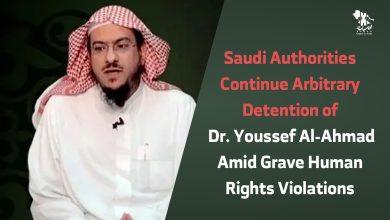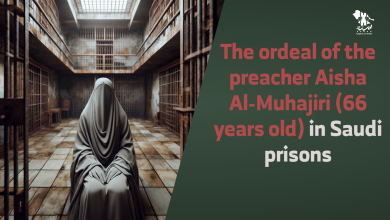
Ahead of the U.S. president’s visit to Saudi Arabia : 16 Rights Groups, Including SANAD, Urge Saudi Arabia to Release Journalists and End Transnational Repression
On May 12, 2025, SANAD Human Rights Organization, along with 15 other international organizations, issued a joint statement calling on Saudi authorities to immediately and unconditionally release all detained journalists and writers, lift arbitrary travel bans, and end both legal and digital harassment targeting freedom of expression in the Kingdom.
The statement was released ahead of U.S. President Donald Trump’s visit to Riyadh—his first international trip since returning to office—and it highlighted Saudi Arabia’s ongoing domestic repression despite diplomatic whitewashing. It also urged the U.S. administration and Congress to pass stronger legislation to protect journalists residing in the U.S., both Saudi and foreign nationals, from transnational repression, particularly through surveillance and spyware.
The statement recalled that more than seven years have passed since journalist Jamal Khashoggi was murdered inside the Saudi consulate in Istanbul, with no real accountability, despite U.S. intelligence confirming the operation was approved by Crown Prince Mohammed bin Salman. The signatories noted that impunity in Khashoggi’s case emboldened Saudi authorities to continue their crackdown on independent journalists, cartoonists, and bloggers, creating a nationwide climate of fear.
According to the 2025 Reporters Without Borders press freedom index, Saudi Arabia ranked 162 out of 180 countries, while the Committee to Protect Journalists documented at least 10 journalists imprisoned as of the end of 2024—making Saudi Arabia the 10th worst jailer of journalists worldwide.
The statement also spotlighted the case of Saudi cartoonist Mohammed Alhazza Alghamdi , who published work in Qatar’s Lusail newspaper. He was arrested in February 2018, initially sentenced to six years in prison with a travel ban, but after completing his sentence in 2024, it was suddenly extended to 23 years with no right to appeal, based on vague charges of “sympathy with Qatar” and “insulting the Saudi government”—despite normalization of relations with Doha.
It also referenced the July 2024 arrest of Turkish journalist Kurtuluş Demirbaş while covering Turkey’s under-19 football team in Saudi Arabia. He was released after diplomatic intervention, and reports suggest he was detained for carrying a photo of Khashoggi, which authorities perceived as a threat.
Despite the 2025 release of several activists, such as Palestinian journalist Hatem Al-Najjar, many remain banned from travel or media work. One example is Saudi blogger Raif Badawi, who was released in 2022 after 10 years in prison but still faces a 10-year travel ban, preventing his reunion with family in Canada.
The statement warned of a new media law in the works that would require government licenses for all media activity, ban so-called “false news,” and prohibit criticism of the royal family or public policy—posing a serious threat to what remains of freedom of expression. It also condemned the use of counterterrorism and cybercrime laws to criminalize peaceful speech.
It pointed to Saudi Arabia’s use of Israeli Pegasus spyware to surveil journalists such as New York Times reporter Ben Hubbard, and its orchestration of online smear campaigns against female journalists like Ghadah Owais, who is suing the Crown Prince and U.S. influencers in Florida. In a related case, NSO Group was ordered by a U.S. court to pay over $167 million in damages for hacking 1,400 WhatsApp users—evidence pointed to Saudi involvement.
The signatories outlined four key demands:
* Immediate and unconditional release of all detainees imprisoned for peacefully expressing their opinions.
* End arbitrary travel bans against activists, journalists, and their families.
* Reform oppressive laws to protect freedom of the press and expression.
* Halt digital surveillance and disinformation campaigns, and lift censorship of independent media websites.
SANAD Human Rights Organization also called on President Trump to fulfill his moral and political responsibility by raising the issue of detained journalists during his official meetings, and to prevent his visit from becoming a public relations cover for Saudi Arabia’s repressive record.
(SANAD Human Rights Organisation)
Access Now
(ALQST for Human Rights)
Artists at Risk Connection (ARC)
Cartooning for Peace
Cartoonists Rights
(Committee to Protect Journalists – CPJ)
DAWN (Democracy for the Arab World Now)
Freedom Cartoonists
(Gulf Centre for Human Rights)
HuMENA for Human Rights and Civic Engagement
Law and Democracy Support Foundation (LDSF)
PEN America
REDWORD for Human Rights & Freedom of Expression
(Reporters Without Borders – RSF)
SMEX (Social Media Exchange)


